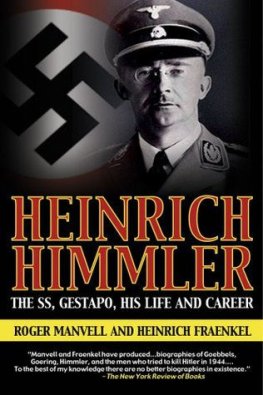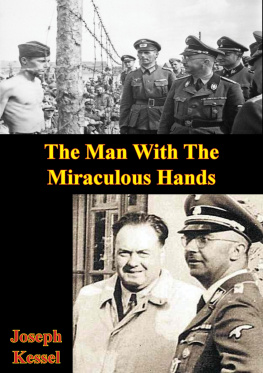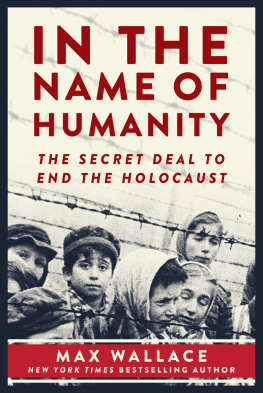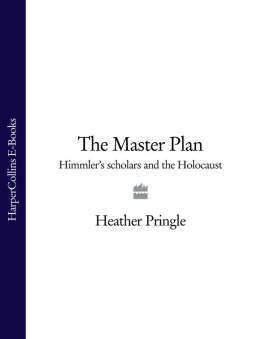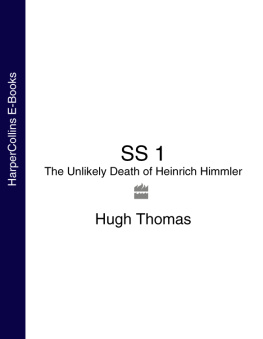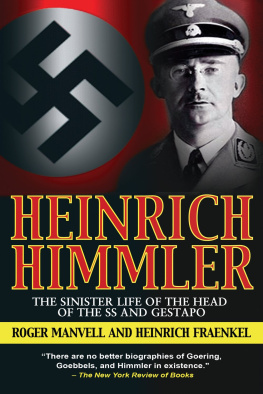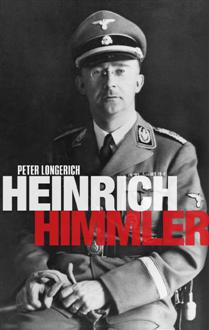Katrin Himmler
The
Himmler Brothers
A German Family History
Translated by Michael Mitchell
PAN BOOKS
For my son
If we had been in their shoes, we might have done the same
Tzvetan Todorov On Human Diversity
Contents
Prologue: The Old Stories
When I was fifteen, one of my classmates suddenly asked during a history lesson whether I was related to the Himmler. I managed to stammer a Yes. There was a deathly hush in the classroom. Everyone was tense and on the alert. But the teacher lost her nerve and went on as if nothing had happened. She missed the opportunity of getting us to see what connection, if any, there still was between us, the new generation, and those old stories.
It was a question I avoided myself for a long time. I knew about Heinrich Himmler, my great-uncle. I knew about the greatest murderer of the century, who was responsible for the extermination of the European Jews and the murder of millions of others. My parents had provided me with books about the Nazi period from an early age. Shaken and tearful, I had read about the failed uprising of the people in the Warsaw ghetto, about the experiences of refugees and the survival attempts of children who were kept in hiding. I identified with the victims, felt ashamed of my name and, in some inexplicable yet distressing way I often felt guilty. Later, when I studied political science, the German past was a key topic for me.
But at the same time I always shied away from looking at the history of my own family. The impetus to do so came only later, and more by chance. My father asked me to search the Federal Archives in Berlin for files about his father. Until then my grandfather, Ernst, whom I had never known, had for me been simply the younger brother of Heinrich Himmler, a technologist, an engineer, Chief Engineer of the Reich Broadcasting Company in Berlin a fairly unpolitical person, from everything that was said. Until then there had been nothing about him to arouse my curiosity.
At my very first perusal of the material I made the unsettling discovery that most of the stories Id heard about him at home did not correspond to what was contained in the thin files. From very early on, it appeared, Ernst Himmler had been a convinced Nazi who, in return for a helping hand in his career from his brother Heinrich, the Reichsfhrer SS, carried out dubious tasks for him. I also gradually discovered that Gebhard, the oldest of the three brothers, was an ambitious careerist and a convinced Nazi from the earliest days of the Party. In 1923 he had taken part in the Hitler, or Beer Hall, Putsch with his brother Heinrich; later he had made a successful career as head of department in the Reich Ministry of Education. I was forced to conclude that both brothers had willingly put their expertise in the service of a conviction they shared with Heinrich and other relatives, and with colleagues and neighbours.
This was also true of the brothers parents. Before 1933 Gebhard Himmler senior, head of a secondary school, and his wife Anna had regarded their second son and his apparent lack of ambition with a certain scepticism and disapproval. Later, however, as their letters to Heinrich show, they became enthusiastic Nazis. They, too, enjoyed advantages and privileges that Heinrich was able to procure for them thanks to his position at the centre of power in the Third Reich.
In the years that followed I was mostly occupied with other things than my family history. At the same time I felt drawn to countries such as Poland and Israel, whose histories had such a close and disastrous connection with the history of Germany and also with that of my own family. Poland was not only the country where Heinrich Himmler had organized the Nazis merciless campaign of extermination against the Jewish and Slav subhumans. In 1939 his brother Gebhard had taken part, as a company commander, in the invasion of Poland, which long after the war he was still describing as a daredevil adventure pursued at breakneck speed. Gebhards brother-in-law Richard Wendler had been the Governor of Cracow when the citys Jews were deported. And it was in the Warthegau, as the Germans called the part of Poland incorporated into the Reich in October 1939, that my grandmother and her children had lived after they had been evacuated from Berlin during the war, on an estate from which the Polish owners had previously been expelled. I kept coming across traces of my family. But the overwhelming guilt of Heinrich Himmler seems to have led his brothers families largely to exonerate their own fathers, despite vague if persistent fears that their involvement might have been greater than they liked to think.
I shared those fears. But, unbelievable as it may sound, it was a full five years after I began my researches that I came across significant documents, certificates, letters and address books in my parents house. I knew that, as far as possible, in the Himmler family every scrap of written material, from electricity bills to drafts of letters to official documents and photos, was kept, but until then I had never specifically asked or looked for them. Here was a folder in which my grandmother, whom I had known and admired, had kept a variety of things. The belated realization that even many years after 1945 she had still been part of a network of old Nazis who gave each other support, had been particularly painful for me.
When pursuing research into ones own family, it is difficult to overcome blind spots and no-go areas created by the closeness to ones subject. It remains a painful process, and one constantly jeopardized by fears of what one might lose.
It took me three years after I first found material about my grandfather in the files before I could accept that I was going to have to see this family history through to the end. In the meantime I had become the mother of a son who would have to bear the burden not only of my own familys legacy: his father comes from a Jewish family that was persecuted by the underlings of my great-uncle Heinrich and whose members to this day remain profoundly traumatized by the murder of many of their relatives. It became clear to me that I must give my child a family history that did not perpetuate the legends current in the family.
That this intention resulted in a book is due to the many who have contributed to it. I would like to thank them here.
It was my father who provided the first impulse to my researches. It was Professor Wolff-Dieter Narr and the seminar group studying The Generation of the Grandchildren of Active National Socialists at the Free University of Berlin who turned it into a concrete research project. I would also like to thank all the members of my family who have put documents at my disposal and endured my repeated interviews with patience.
My extensive researches have been supported by the employees of numerous institutions. I would particularly like to thank Herr Pickro of the Federal Archives in Koblenz, who was extremely helpful and always ready to make time for me. I was also assisted by many at the Federal Archives in Berlin-Lichterfelde, the archives of the Technical University in Munich, the Main State Archives in Dsseldorf, the Berlin regional archives and the Kontakte (Contacts) organization in Berlin.
I am particularly indebted to Michael Wildt of the Institute for Social Research in Hamburg. He was the first specialist historian to read the draft version of the manuscript. My work could not have continued without his encouragement, advice and practical assistance.
Heinz Hhne put material from his private archive at my disposal; Anne Prior was kind enough to provide me with information on the Dinslaken side of my family. Andreas Sander of the Stiftung Topographie des Terrors (Topography of Terror Foundation) helped me with important information, as did Peter Witte.


